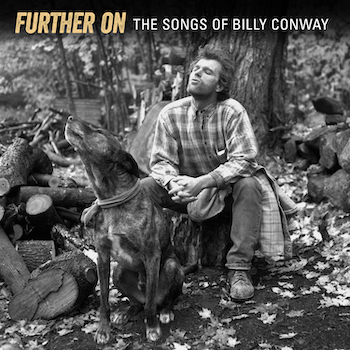Album Review: The Rich Musical Legacy of Drummer Billy Conway
By Scott McLennan
The late Billy Conway didn’t so much work to make a song sound great as, through his adroit drumming, illuminate the qualities in the tunes that made them great.
 It’s not surprising that it took eight different singers, a few guitarists playing on acoustic, electric, and pedal steel instruments, two saxophonists, a trumpeter, a harmonica dude, a bassist, and — of course — a tasteful drummer to create an accurate portrait of Billy Conway. In fact, Conway’s friends and family who came together to make Further On: The Songs of Billy Conway could have loaded on a whole lot more, as through Conway’s long, celebrated career as a drummer there seemed to be no boundaries or barriers to his creativity.
It’s not surprising that it took eight different singers, a few guitarists playing on acoustic, electric, and pedal steel instruments, two saxophonists, a trumpeter, a harmonica dude, a bassist, and — of course — a tasteful drummer to create an accurate portrait of Billy Conway. In fact, Conway’s friends and family who came together to make Further On: The Songs of Billy Conway could have loaded on a whole lot more, as through Conway’s long, celebrated career as a drummer there seemed to be no boundaries or barriers to his creativity.
Diagnosed with cancer in 2018, Conway died in December 2021 at age 65, leaving behind a legacy of stellar work with the bands Treat Her Right, Morphine, and Twinemen, the band he formed with his wife Laurie Sargent, as well as the music he made in partnerships with Jeffrey Foucault, Chris Smither, Kris Delmhorst, Caitlin Canty, and countless others.
All of this music blurred the lines of rock, folk, jazz, and blues, and Conway was preternaturally adept at creating whatever atmospheric pulse was needed to help get the songs across. All these bands and artists were vital to creating a very distinct musical community and sound based in the Boston area that spread globally. It’s no surprise that top-notch songwriters such as Foucault, Smither, and Delmhorst would be attracted to Conway’s playing. The drummer didn’t so much work to make a song sound great as, through his adroit performances, illuminate the qualities in the songs that made them great. It’s misleading to call Conway a minimalist drummer, but he’ll also never get accused of being a guy who overplayed his part.
Further On takes a similar approach. The singers and players carefully shepherd Conway’s ideas along, letting the power of his words and melodies take center stage.
In March of 2022, musicians from Conway’s extensive orbit arrived at the house in New Hampshire that the drummer and Sargent lived in when the couple moved back to New England a few years ago following a retreat to Montana. Foucault and Sargent gathered songs that Conway had written and placed on lo-tech recordings. Some of the songs went back to the early ’70s, when Conway was kicking around musical ideas in high school and later while attending Yale University.
Foucault compared Conway to John Prine.
“When he started writing, he immediately had a voice,” said Foucault, who performed with Conway regularly starting in 2009. “Billy was like John Prine in that they had this natural method of getting the songs out in their own voice. They had really close connections to the songs. Billy kept the language simple, and used a lot of metaphor. And he’s funny.”
Further On is a terrific record, in spite of the way it was made. Foucault described the process: people moved in and out of a makeshift studio over a two-week period and no one person was really in charge of how things would go down. The do-it-yourself project is available on Bandcamp, bypassing the label structure (at least for now). “Billy was a DIY guy, so we stuck with the DIY approach,” Foucault said.
Foucault opens the record singing “Love Ain’t Around,” a melancholy shuffle fleshed out with yearning horn lines and keening pedal steel. Skip ahead a couple of songs and Kris Delmhorst sings “Come With Me,” a lovely sounding song about extending a hand to another.

The late Billy Conway playing the guitar. Photo: Jeffrey Foucault
But those songs, which look at two sides of the relationship coin, are separated by Chris Smither’s breathtaking “Outside Inside,” a memorable exercise in introspective soul-searching. It was the title track to the full-length album Conway made in 2020, seemingly aware that he might not have much more time to get some of his songs into the world.
Jeremy Moses Curtis uses “Holding On” to evoke the spooky minimalism Conway excelled at, while Jabe Beyer leads a more pointed arrangement of “Quit Keeping Score.”
Sargent presents the album’s two most artistically adventurous tracks: “I Can Feel You Moving” is given a cathartic performance that accents the tune’s noirish understatement; and “Like Annette,” which features haunted imagery set to a liquid score, an exercise that is very much in keeping with the experimentation Conway engaged in over the years.
Foucault, Beyer, Smither, Curtis, and Delmhorst also perform a second song on the project but, before we get to them, the trio of tunes set in the middle of the album forms the project’s spiritual core.
First, there is the stunning performance by a then-13-year-old Hazel Foucault (daughter of Jeffrey and Kris Delmhorst) on “Trouble in Heaven,” gospel folk that is offered up as balm for a troubled time.
Following that is the instrumental “Walking in Daylight,” which honors Conway’s legacy of being provocative without needing to be brash to do so.
Caitlin Canty then sings “After All,” a song about where one should ground one’s life. It’s a tune with an easy flow that also suggests that simplicity isn’t always so simple. The stuff we really need isn’t always the stuff we are focused on.
With its “a-side/b-side” structure of sorts, Further On draws on an emotional narrative arc that ends, appropriately, with the project’s title track, sung by Beyer. It’s as if Conway wrote his own epitaph with this song, asserting that he hoped that he gave back all that he took. He finds solace in the fact that he was part of something creative and inspirational — something that will carry on beyond him. Beyond everyone who sang these songs. Beyond everyone who has the good fortune of hearing these songs.
Scott McLennan covered music for the Worcester Telegram & Gazette from 1993 to 2008. He then contributed music reviews and features to the Boston Globe, Providence Journal, Portland Press Herald, and WGBH, as well as to the Arts Fuse. He also operated the NE Metal blog to provide in-depth coverage of the region’s heavy metal scene.
Tagged: Billy Conway, Caitlin Canty, Chris Smither, Further On: The Songs of Billy Conway, Jabe Beyer, Jeffrey Foucault

Thanks for this insightful and intelligent review!